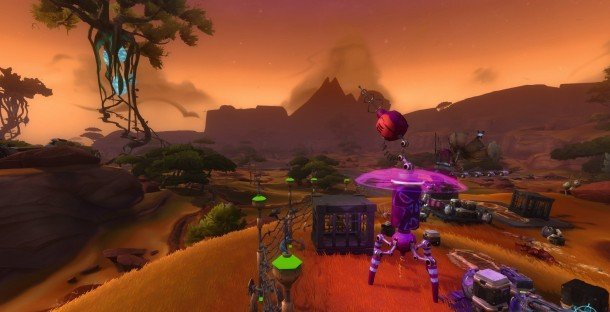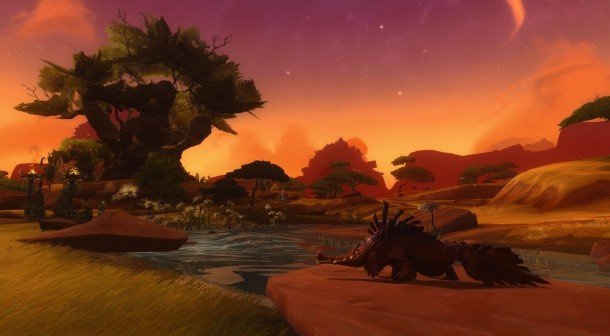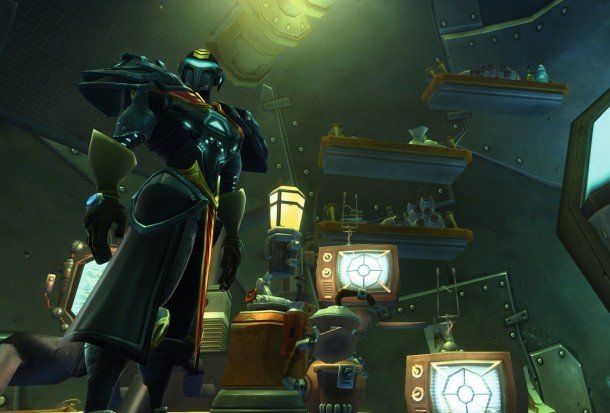Wildstar hands-on: have Carbine created the perfect second MMO?

Players can pitch in with one another's missions regardless of their own path, meaning that you're not wholly locked out of these other parts of the game. This is a potentially clever use of divergent play styles, giving people a reason to come together while emphasising each other's personal choices.
"Stumbling across a highlighted patch of ground can lead to a drop into a monster-infested cavern and a new set of quests."
Intrigued to see just how much of a difference your choice of path makes, I switch characters. As a human spellslinger, the way I approach combat changes substantially – armed with a pair of laser pistols I focus on kiting groups of enemies into position for a mixture of channelled and charged ranged attacks. As an explorer, my path-specific missions lead me into very different situations to the ones I found myself in as a soldier.
The exploratory approach is intended for players who would otherwise spend their time pushing at the fringes of each zone, trying to reach impassable areas. Deradune is dotted with tall, winding trees that are only climbable by explorers. Every zone will have a number of these jumping puzzles to complete, and finishing the whole set earns you a reward. This is what I did first, and as a consequence my initial impressions of the explorer aren't great – following an arrow to a jumping challenge with a fixed solution doesn't feel like exploring, and as these challenges are something that have to be completed solo there's no room for ad-hoc socialisation.
I get more enjoyment out of the explorer's other key ability, which is the power to unlock a long network of tunnels that link diverse parts of the zone. Stumbling across a highlighted patch of ground can lead to a drop into a monster-infested cavern and a new set of quests before emerging back onto the surface – or, in one case, onto a cliff-top route patrolled by enemy aircraft. Explorers can also unlock shortcuts for other players, which will be their chief contribution to social play. Nonetheless, I found the path a little lonely in the time I spent with it.

The fact that I enjoyed one path over another isn't surprising – players are, after all, expected to pick the play style that suits them, and I wouldn't necessarily choose to play in this way in the final game. I asked Gaffney whether he was concerned that giving players such a significant decision to make right at the start of their time with the game could backfire – particularly considering the trend in recent MMOs towards reducing the amount of choices made at character creation.
"There's an obvious devotion to the traditions of the genre mixed up with a studied effort to do things better."
“There are a lot of babies that get thrown out with the bathwater, you know?” He says. “You don't want a horribly punitive death penalty, but what about that friend you made because they saved you from dying? Those bonds are weakened when you don't care that someone saved you. As designers we need to know when pain can be fun, or when the pain makes things meaningful and when removing it can trivialise things.”
In this sense, then, my preference for one path over another – even my confusion when faced with an overwhelming amount of different things to do – is a negative response that the developers are willing to risk incurring if it means giving players more freedom to meaningfully outline the parameters of their own game experience. It's an old-school sentiment wrapped up in a game with a lot of new ideas, an obvious devotion to the traditions of the genre mixed up with a studied effort to do things better.
Keep up to date with the most important stories and the best deals, as picked by the PC Gamer team.
“We're not aiming for the lapsed MMO crowd because of grand focus groups and research,” Gaffney tells me. “We're aiming for it because it's us.”

Joining in 2011, Chris made his start with PC Gamer turning beautiful trees into magazines, first as a writer and later as deputy editor. Once PCG's reluctant MMO champion , his discovery of Dota 2 in 2012 led him to much darker, stranger places. In 2015, Chris became the editor of PC Gamer Pro, overseeing our online coverage of competitive gaming and esports. He left in 2017, and can be now found making games and recording the Crate & Crowbar podcast.


